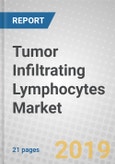The Report Includes:
- An overview of Tumor Infiltrating Lymphocytes (TILs) for the treatment of metastatic cancer
- Discussion of the development of TIL as a treatment option for melanoma and the possibilities to expand this therapy to other types of cancer
- Exploration of adoptive T-cell therapy (ATCT) using antigen-specific CD8+ T cell clones for the treatment of patients with metastatic melanoma, and the curative potential of ATCT in a variety of other solid tumors
- Comparison between two main technologies of tumor immunotherapy, chimeric antibody receptor engineered T Cell (CAR-T) and genetically modified T cell receptors (TCR)
- Information on the role of TILs as a strong prognostic biomarker for triple-negative breast cancer (TNBC) and their potential ramifications
Table of Contents
Executive Summary
Tumor-infiltrating lymphocytes (TILs), which include B-cells, T-cells, and natural killer (NK) cells, are an important component in anti-tumor immune responses. TILs involve the use of special immune cells called T-cells, a type of lymphocyte or white blood cell. Lymphocytes protect the body from viral infections, help other cells fight bacterial and fungal infections, produce antibodies, fight cancers, and coordinate the activities of other cells in the immune system.
Some tumors are highly infiltrated by immune cells, while only subtle infiltrations are detectable in others. In general, an increased number of immune cells correlates with a favorable clinical outcome in various malignancies, such as melanoma, colorectal, lung and breast cancers. TILs may offer a new target for cancer immunotherapy - to allow the precise killing of cells through tumor antigen recognition - and may also serve as a prognostic biomarker in a variety of cancers.
TILs express a variety of different antigens on their cell membrane including CD3, CD4, CD8, CD16, CD20, CD56 and CD57, CD68, CD169 and FOXP3, to regulate the immune system and to suppress tumor growth (Table 1). Several studies have demonstrated that upregulation of immune checkpoint (CP) proteins such as PD-1, CTLA-4, Tim-3 and LAG-3, can lead to TILs exhaustion and tumor progression, whereas blockade of CP proteins suppresses tumor growth, increases glucose uptake in TILs and reinvigorates their function.
Companies Mentioned
- Iovance Biotherapeutics
- Optera Therapeutics Corp
- TILT Biotherapeutics








